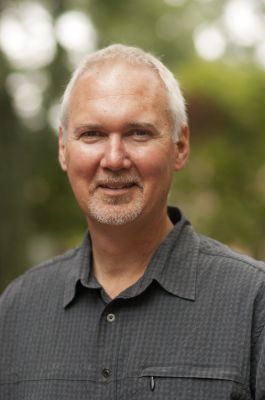Keith Graber Miller

Professor of Bible and Religion
What drew you to want to teach at Goshen College?
I began teaching in the 1986-87 year, first as an adjunct professor in the communication and English departments. I had been a congregational pastor and was invited to teach several courses at GC and also to be interim campus pastor. I utterly loved the teaching and decided to return to graduate school to complete a Ph.D. in religion since religious studies is my passion. My spouse and I both were grateful for the opportunity to lead Study-Service Term (SST) at Goshen College, and we’ve led nine international study semesters since 1989.
What do you love most about teaching GC students?
Our students are exceedingly engaged in learning, curious about the world and open to being pushed academically and spiritually. I’m grateful for the relationships we build with students inside and outside the classroom — especially in the introductory frosh course Identity and Culture in Community, in senior seminars and also on SST. Most of our students come out of some faith background (Christian, Buddhist, Muslim, other) and are sorting through their theological convictions and faith commitments while at GC. I love walking alongside students while they are on this quest for authentic meaning and — for some — honest faith. I truly see my teaching, especially at a place like Goshen College, as my calling.
What excites you about your field of study?
Religious studies is an incredibly important field, especially in the 21st century when so many world events pivot around religious understandings and commitments. We have to know something about religion to understand far-reaching political and cultural alterations in our social landscape. So part of my interest is in helping students negotiate a religiously-infused world with wisdom and care. For those students who are religious, I’m interested in helping them seek authentic, life-giving faith — and sometimes that means shedding some things and revising some other beliefs and practices. All of the courses I teach — Christian Theologies, Living Ethically, Religion and Sexuality, Religion in America, Religion and Politics, Religion in Culture and Society — are foundational courses for understanding the world and for living in the world in meaningful ways.
What do you enjoy doing outside of your academic work?
My spouse and I own an international art gallery — Found — in downtown Goshen, and I see that as an extension of my college work and a combination of my academic work (religion) and my spouse’s (art). We have lots of religious art at the shop — from Western Christian, Eastern Orthodox Christian, Buddhist, Hindu, animist, voodoo and other religious traditions. We sometimes say that in the gallery we’re trying to help the religions of the world get along, with the hope that that might happen outside of our shop as well. As a family, we love international travel, and most years we try to make it to two or three countries abroad. As part of that, we search out unique antiques and artifacts and bring them back to the U.S. for our home or the gallery. We also do a lot of antiquing in the U.S.
I still love a good game of racquetball and I’m now teaching our youngest son to play. We enjoy visiting our son and daughter-in-law (recent Goshen grads) in Chicago where they are launching their careers in business and accounting. And we enjoy spending time with our two children who are still at home — playing Scrabble and Ping-Pong, dining out at ethnic restaurants. I begin each day with a 6:30 a.m. walk with our dog Mac, and that gets me going. And when I’m not doing extensive grading or reading for courses, I love a good novel.
How does the college’s vision connect or shape your teaching and work?
All of the work I do at Goshen College is intercultural, interdisciplinary and integrative, and much of it is international. This is perhaps the truest statement about what a Goshen College education is about. That vision shapes everything I teach and all of the ways I interact with students.
How do you strive to make peace through your work and life?
As I mentioned earlier, in our shop we’re interested in helping the religions of the world get along. I’m also interested in helping the religious of the world — and the non-religious — get along. Understanding each other and knowing something about our religious traditions is essential. As a Mennonite Christian, I’m quite grounded in my own faith tradition, but I’m also open to learning from every other faith tradition or worldview, and believe that many other religious and secular traditions have truths that Christians need to learn. I’m also always grateful for interactions with those who are non-religious or anti-religious since they help me live more honestly and authentically. We need each other to round out our perspectives. For those of us who are religious, we should live non-anxiously, not feeling threatened by those of other worldviews.
Is there anything else you would like prospective students to know about you?
Our family has loved working with Goshen’s SST program, partly because we love to see the way students’ worlds open up. I know of no better way to learn than to be placed in a vulnerable situation where we speak the language haltingly — like fools, perhaps. That deep vulnerability is also a place of deep learning.




